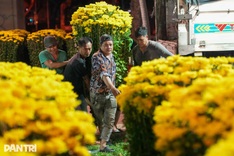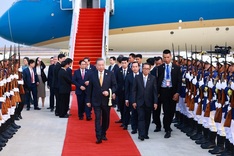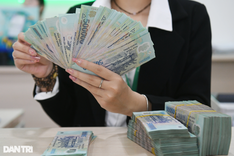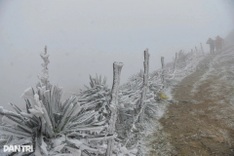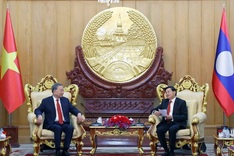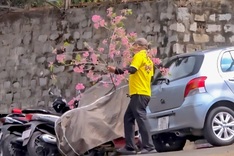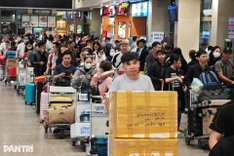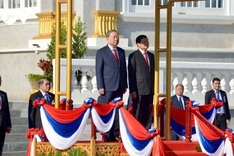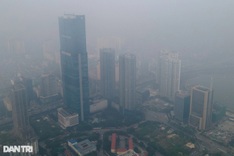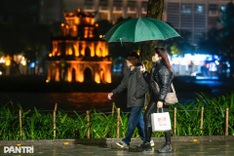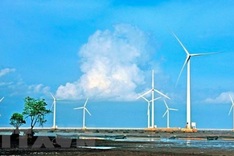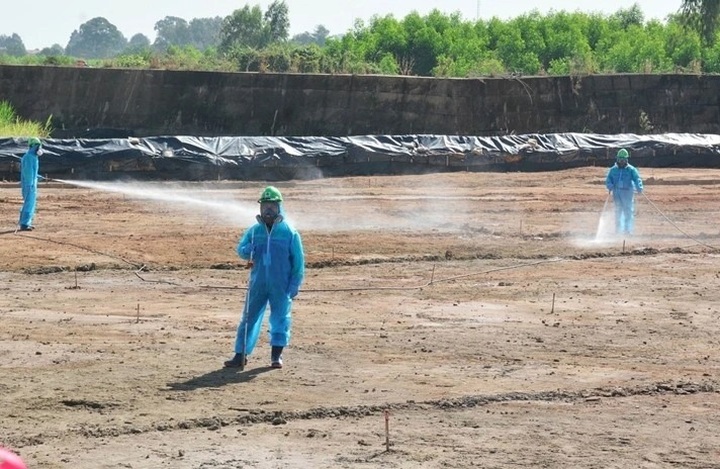
Dioxin treatment at Bien Hoa Airport projec (Photo:qdnd.vn)
Half a century after the Vietnam War, the lingering effects of Agent Orange/dioxin still devastate lives and the environment. Vietnam has received strong support from the international community, including Belgium, a responsible and sincere partner in its recovery efforts.
At the research facility of Haemers Technologies SA in Belgium, experts are perfecting a high-temperature thermal treatment technology for dioxin-contaminated soil. The process involves placing polluted soil into a closed treatment system, where dioxin is completely decomposed without releasing solid, liquid, or gaseous waste into the environment.
Engineer Ysaline Depasse in charge of contaminated-soil treatment at the company, said the system works by directly heating the soil through thermal wells drilled 2 to 30 metres deep into the contaminated area. Heat from the burners vaporizes toxic compounds, which are then captured and burned in a combustion chamber to eliminate dioxin completely.
According to Jan Haemers, CEO of Haemers Technologies, the company’s proprietary technology is based on a deep-thermal desorption method that heats soil to as high as 1,200°C to destroy dioxin entirely. The technology was tested at Bien Hoa airbase under the supervision of Vietnam’s Ministry of National Defence, with financial support from the Belgian Aquitara Impact I Fund. The pilot phase was successfully completed in 2022 and is now pending approval for scaling up.
The spirit of cooperation between Vietnam and Belgium was further highlighted at the Vietnam-Belgium Workshop on Dioxin Remediation, organized by the Belgium-Vietnam Alliance (BVA) in Brussels. Participants, including experts, businesses, and investors, shared experiences and discussed ways to expand the project. Haemers noted that the technology not only thoroughly treats contaminated soil at Bien Hoa but also regenerates it, turning polluted land into arable soil, creating dual environmental and economic value.
Franc Bogovic, representative of Aquitara Impact I, said the fund pursues a dual goal: cleaning the environment while supporting sustainable livelihoods. A notable example is An Vui Mart in northern Dong Nai Province, where families of Agent Orange victims help manage daily operations. The model has produced encouraging results after eight weeks of operation, demonstrating how environmental rehabilitation can go hand in hand with social development.
Beyond corporate partnerships, many Belgian individuals have also made practical contributions. For over a decade, Chris Geyskens, Chairwoman of the Belgian branch of the International Association of Vietnamese Victims of Agent Orange/Dioxin- Hoi An, has organized the annual Vietnam Ambassador’s Charity Golf Cup, raising funds to build houses and create jobs for affected families. She expressed hope that these efforts will help younger Europeans better understand the war’s aftermath in Vietnam and spread compassion and social responsibility.
From the Belgian Government, Andries Gryffroy, First Vice President of the Senate and President of the BVA, emphasized that Belgium was the first country in the world to officially recognize Vietnamese victims of Agent Orange. He highly appreciated the ongoing cooperation between the two countries and said both sides are finalizing financial arrangements and land-use negotiations to expand the project. “After war, what matters most is resilience,” he said. “Vietnam has demonstrated that through its proactive international cooperation to overcome war legacies and pursue sustainable development.”
Thanks to close coordination among governments, businesses, and social organizations of both countries, Vietnam’s dioxin-remediation projects are steadily moving from pilot to implementation. Severely contaminated areas are being restored, while livelihood models for victims are creating new opportunities for thousands of households.
These joint efforts show not only the effectiveness of advanced technology and international partnership, but also a shared vision of sustainable development, where the environment, economy, and people recover together. From lands once scarred by war, green shoots of hope are emerging, symbolising Vietnam’s resilience and the enduring friendship between Vietnam and Belgium.

